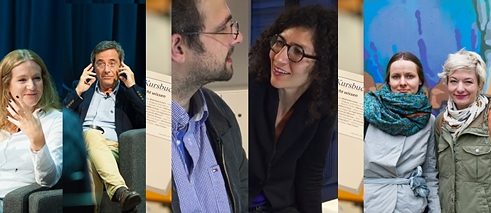Kritikmaschine
Kursbuch takes a trip around the world

Kursbuch is celebrating! For more than 50 years, the cultural magazine has been offering up-to-date discussions on politics, business and society. Together with the Goethe-Institut, the editorial team is organizing a transnational event series called Kritikmaschine. Watch videos here with excerpts from the socio-political talks in Moscow, Lisbon and Paris.
Kursbuch, one of Germany’s leading intellectual magazines, reflects in new ways on politics, economics and society. Its 50th anniversary is being celebrated with the event series “Kritikmaschine” (criticism machine) for which eight German intellectuals are travelling to Boston, Jakarta or Riga – to name just a few of the 26 venues – to discuss socio-political topics before an audience.
When intellectuals in different cities around the world meet their colleagues from a host country, it can be confrontational, enriching and illuminating. A visit to Russia offers new insights into German feminism, Heinz Bude hits a nerve in Seoul with his topic “The Anxious Society,” and philosopher Grigory Yudin responds in St. Petersburg to the lecture by Kursbuch editor Armin Nassehi.
The event series not only aims to show how people are thinking and arguing in Germany; in particular it aims to initiate an international exchange, to confront foreign perspectives with each other, to look for new answers as well as new questions. At the end of the tour, German and foreign intellectuals will meet in 2017 for a dialogical conference in Munich.
In the three videos below, two intellectuals talk with one another about feminism, displacement and change in the world of work.